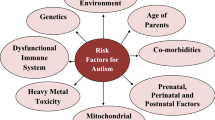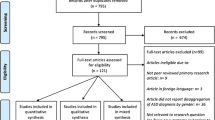Abstract
In many cases, X-linked conditions are transmitted through families “silently” until the first affected individual is diagnosed. Grandmothers are often then tested to help determine the risk to other family members. To date, psychosocial research on carriers of X-linked conditions has focused primarily on mothers and sisters of affected males. In the wider social science literature, studies on grandparents of children with disabilities have centered on their role within the family and relationship with the grandchild. We therefore know little about the impact of carrier testing for a genetic condition on grandparents. This qualitative study aims to contribute towards filling that gap. This study included thirteen grandmothers in families with Fragile X or Duchenne muscular dystrophy; ten had living affected grandsons and three had daughters who chose not to continue with affected male pregnancies after prenatal diagnosis. All thirteen took part in semi-structured interviews and provided a rich and varied data source for conducting thematic analysis. Most of the grandmothers expressed recurring feelings of guilt and a strong sense of responsibility for what had occurred in the family. Other themes included feelings of shock after receiving their test result, changes in family relationships and searching to make sense of the inheritance within the context of the family’s experience. This study provides evidence that X-linked carrier testing can have a profound and lasting impact on grandmothers. Although genetic counseling for X-linked conditions is often focused on the potential reproductive implications for carriers, these findings suggest that grandmothers should also be offered genetic counseling when tests are carried out, because of the likely psychosocial impact of a positive test result.
Similar content being viewed by others
References
Anido, A., Carlson, L. M., Taft, L., & Sherman, S. L. (2005). Women’s attitudes toward testing for fragile X carrier status: a qualitative analysis. Journal of Genetic Counseling, 14, 295–306.
Anido, A., Carlson, L. M., & Sherman, S. L. (2007). Attitudes toward fragile X mutation carrier testing from women identified in a general population survey. Journal of Genetic Counseling, 16, 97–104.
Armstrong, D., Michie, S., & Marteau, T. (1998). Revealed identity: a study of the process of genetic counselling. Social Science & Medicine, 47, 1653–1658.
Bailey, D. B., Skinner, D., Hatton, D., & Roberts, J. (2000). Family experiences and factors associated with the diagnosis of Fragile X Syndrome. Journal of Developmental and Behavioral Pediatrics, 21, 315–321.
Bailey, D. B., Jr., Sideris, J., Roberts, J., & Hatton, D. (2008). Child and genetic variables associated with maternal adaptation to fragile X syndrome: a multidimensional analysis. American Journal of Medical Genetics. Part A, 146A, 720–729.
Bernhardt, B. A. (2008). The role of qualitative research in medical genetics: listening to the voices of our patients. American Journal of Medical Genetics. Part A, 146A, 3132–3135.
Bernhardt, C., Schwan, A. M., Kraus, P., Epplen, J. T., & Kuntsmann, E. (2009). Decreasing uptake of predictive testing for Huntington’s disease in a German centre: 12 years’ experience (1993–2004). European Journal of Human Genetics, 17, 295–300.
Biesecker, B. B., & Erby, L. (2008). Adaptation to living with a genetic condition or risk: a mini-review. Clinical Genetics, 74, 401–407.
Boström, K., & Ahlström, G. (2005). Living with a hereditary disease: persons with muscular dystrophy and their next of kin. American Journal of Medical Genetics. Part A, 136, 17–24.
Bryant, L. D., Green, J. M., & Hewison, J. (2010). The role of attitudes towards the targets of behaviour in predicting and informing prenatal testing choices. Psychology & Health, 25(10), 1175–1194.
Buchanan, D. C., LaBarbera, C. J., Roelofs, R., & Olson, W. (1979). Reactions of families to children with Duchenne muscular dystrophy. General Hospital Psychiatry, 1, 262–269.
Claes, E., Denayer, L., Evers-Kiebooms, G., Boogaerts, A., & Legius, E. (2004). Predictive testing for hereditary non-polyposis colorectal cancer: motivation, illness representations and short-term psychological impact. Patient Education and Counseling, 5(2), 265–274.
Creswell, J. (1998). Qualitative inquiry and research design: Choosing among five traditions. Sage Publications.
Dabelko-Schoeny, H., & King, S. (2010). In their own words: participants’ perceptions of the impact of adult day services. Journal of Gerontological Social Work, 53, 176–192.
Hall, E. O. (2004). A double concern: grandmothers’ experiences when a small grandchild is critically ill. Journal of Pediatric Nursing, 19, 61–69.
Hastings, R. P. (1997). Grandparents of children with disabilities: a review. International Journal of Disability, Development and Education, 44(4), 329–340.
Hastings, R., Thomas, H., & Delwiche, N. (2002). Grandparent support for families of children with Down’s Syndrome. Journal of Applied Research in Intellectual Disabilities, 15, 97–104.
Hornby, G., & Ashworth, T. (1994). Grandparents’ support for families who have children with disabilities. Journal of Child and Family Studies, 3, 403–412.
Jacobs, L. A., & Deatrick, J. A. (1999). The individual, the family and genetic testing. Journal of Professional Nursing, 15, 313–324.
James, C. A., Holtzman, N. A., & Hadley, D. W. (2003). Perceptions of reproductive risk and carrier testing among adolescent sisters of males with chronic granulomatous disease. American Journal of Medical Genetics. Part C: Seminars in Medical Genetics, 119C(1), 60–69.
James, C. A., Hadley, D. W., Holtzman, N. A., & Winkelstein, J. A. (2006). How does the mode of inheritance of a genetic condition influence families? A study of guilt, blame, stigma and understanding of inheritance and reproductive risks in families with X-liked and autosomal recessive diseases. Genetics in Medicine, 8, 234–242.
Katz, S., & Kessel, L. (2002). Grandparents of children with developmental disabilities: perceptions, beliefs, and involvement in their care. Issues in Comprehensive Pediatric Nursing, 25, 113–128.
Kay, E., & Kingston, H. (2002). Feelings associated with being a carrier and characteristics of reproductive decision making in women known to be carriers of X-linked conditions. Journal of Health Psychology, 7(2), 169–181.
Margetts, J. K., Le Couteur, A., & Croom, S. (2006). Families in a state of flux: the experience of grandparents in autism spectrum disorder. Child: Care, Health and Development, 32, 565–574.
McConkie-Rosell, A., & DeVellis, B. M. (2000). Threat to parental role: a possible mechanism of altered self-concept related to carrier knowledge. Journal of Genetic Counseling, 9, 285–302.
McConkie-Rosell, A., Spiridigliozzi, G. A., Iafolla, T., Tarleton, J., & Lachiewicz, A. M. (1997). Carrier testing in the fragile X syndrome: attitudes and opinions of obligate carriers. American Journal of Medical Genetics, 68, 62–69.
McConkie-Rosell, A., Spiridigliozzi, G. A., Sullivan, J. A., Dawson, D. V., & Lachiewicz, A. M. (2000). Carrier testing in fragile X syndrome: effect on self-concept. American Journal of Medical Genetics, 92, 336–342.
McConkie-Rosell, A., Spiridigliozzi, G. A., Sullivan, J. A., Dawson, D. V., & Lachiewicz, A. M. (2001). Longitudinal study of the carrier testing process for fragile X syndrome: perceptions and coping. American Journal of Medical Genetics, 98, 37–45.
Meiser, B. (2005). Psychological impact of genetic testing for cancer susceptibility: an update of the literature. Psychooncology, 14(12), 1060–1074.
Penn, C., Watermeyer, J., MacDonald, C., & Maobelo, C. (2010). Grandmothers as gems of genetic wisdom: exploring South African traditional beliefs about the causes of childhood genetic disorders. Journal of Genetic Counseling, 19, 9–21.
Peterson, S. K. (2005). The role of the family in genetic testing: theoretical perspectives, current knowledge, and future directions. Health Education & Behavior, 32, 627–639.
Richards, M. P. M. (1993). The new genetics: some issues for social scientists. Sociology of Health & Illness, 15, 567–586.
Richards, M. P. M. (1996). Lay and professional knowledge of genetics and inheritance. Public Understanding of Science, 5, 217–230.
Richards, L., & Morse, J. M. (2007). User’s guide to qualitative methods (2nd Ed.). Sage Publications.
Rolland, J. S., & Williams, J. K. (2005). Toward a biopsychosocial model for 21st-century genetics. Family Process, 44, 3–24.
Schilmoeller, G., & Baranowski, M. (1998). Intergenerational support in families with disabilities: grandparents’ perspectives. Families in Society, 79, 465–476.
Walsh, F. (2003). Family resilience: a framework for clinical practice. Family Process, 42, 1–18.
Wehbe, R. M., Spiridigliozzi, G. A., Heise, E. M., Dawson, D. V., & McConkie-Rosell, A. (2009). When to tell and test for genetic carrier status: perspectives of adolescents and young adults from fragile X families. American Journal of Medical Genetics. Part A, 149A(6), 1190–1199.
Williams, J. K., & Schutte, D. L. (1997). Benefits and burdens of genetic carrier identification. West Journal of Nursing Research, 19, 71–81.
Acknowledgements
We would like to thank the grandmothers who agreed to take part in this study and shared so openly their feelings and experiences. We are grateful to the anonymous reviewers of the original submitted manuscript for their constructive and insightful comments which have contributed positively to the revised paper. We would also like to thank Rhona McLeod for her helpful comments on the manuscript.
Author information
Authors and Affiliations
Corresponding author
Additional information
Joint First Authors: Anna Lehmann and Beverley S. Speight
Rights and permissions
About this article
Cite this article
Lehmann, A., Speight, B.S. & Kerzin-Storrar, L. Extended Family Impact of Genetic Testing: The Experiences of X-linked Carrier Grandmothers. J Genet Counsel 20, 365–373 (2011). https://doi.org/10.1007/s10897-011-9360-2
Received:
Accepted:
Published:
Issue Date:
DOI: https://doi.org/10.1007/s10897-011-9360-2




